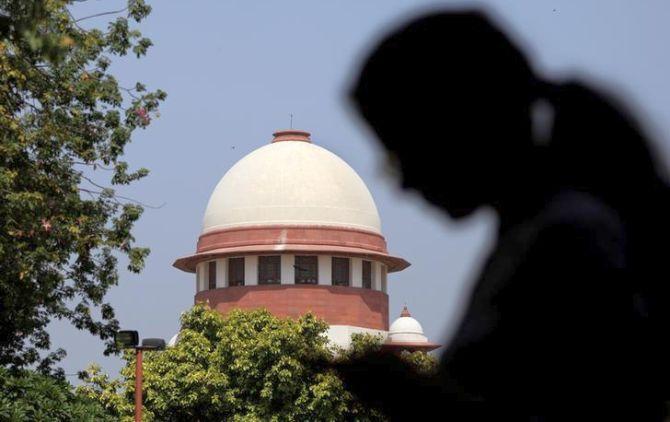The court can neither rewrite nor alter provisions and the very fundamental architecture of a law as conceived at the time of its framing even by reading something into it, the Centre told the Supreme Court on Wednesday.

The Centre's submission came when the court was hearing pleas seeking legal sanction for same-sex marriage. It asserted that the legislature alone can deal with the issues raised in the pleas.
In his written submissions, Solicitor General Tushar Mehta, representing the Centre, said the impact of the socio-legal recognition of same-sex relationships as "marriage" on the society as a whole has to be kept in mind before any decision is taken in the matter.
"The matter cannot be just viewed as an individualistic constitutional pursuit, and the larger interests of human society and Indian society need to be appreciated in this regard," he said.
Mehta said it is only the legislature which can, in its wisdom after gathering all details, taking several factors into consideration and as per the emerging legislative policy, conceive of a comprehensive piece of legislation for all LGBTQIA+ (lesbian, gay, bisexual, transgender, queer, questioning, intersex, pansexual, two-spirit, asexual, and ally) persons.
A five-judge Constitution bench comprising Chief Justice D Y Chandrachud and Justices S K Kaul, S R Bhat, Hima Kohli and P S Narasimha continued hearing arguments in the matter for the fifth day on Wednesday.
Mehta said in his written submissions that the matter represents a ”profound anthropological and social question” concerning prayers made by the petitioners seeking creation of a new socio-legal status and institution of "marriage" for the class of persons for which no such legal status exists under the statutory mechanism in place.
He said the ”heart” of the Special Marriage Act, 1954, is to provide a legislative framework for inter-faith marriages but doubtlessly between heterosexual couples.
"The court will have to examine the entire architecture of the Act rather than to examine few words like 'husband', 'wife', etc. The prayer to declare the said Act unconstitutional merely because it recognises only heterosexual marriages, therefore, must fail," he said.
"The court can neither rewrite the provisions nor can alter the very fundamental architecture of an Act as conceived by the legislature at the time of framing of the Act even by reading something which was consciously omitted at the time of enactment,” Mehta said.
In his written submissions, he said the socio-legal recognition to "same-sex relationships" in particular and all shades of LGBTQIA+ in general has a very nascent history which started in 2001 in the Netherlands.
The solicitor general said this movement for socio-legal recognition to same-sex relationships need to put into perspective that it has roughly been 20 years since this ”experiment” began in a particular part of the world in contradistinction to the unbroken line of continuity of opposite-sex marriage in human civilisation since time immemorial.
"The tall claims of 'scientific evidence', especially with regard to the impact of socio-legal recognition to non-heterosexual relationships as 'marriage', considering the nascent history of the same, require far more evidence, material and time before any sweeping claims can be made or accepted,” he said.
Mehta said the protection and preservation of fundamental rights of LGBTQIA+ community is not in dispute and in fact, this is fully protected by Parliament itself by making the Transgender Persons (Protection of Rights) Act, 2019.
"The question really is whether to confer socio-legal status of 'marriage' or any other name to such a relationship. This is essentially is a question based upon the legislative policy,” he said.
"The court can adjudicate an enactment and protect fundamental rights but will not have the jurisdiction to create a new socio-legal institution between two or more human beings clearly not contemplated by any legislation,” Mehta said.
The solicitor general also said in his written submissions that any exercise of either reading down the provisions of the Special Marriage Act, 1954 and/or reading into some words in various provisions of the law or any other Act not intended to be used by the legislature will have an unintended effect on the rights of heterosexual couples under the legislation.
"The judicial process of interpreting any legislation, even for the purpose of making such legislation constitution compliant, cannot result into a situation where the same enactment applies to one class of citizens differently and to another class of citizens differently. Such internal classification can be made only by the competent legislature and not by the process of judicial interpretation," he said.
Mehta said in the countries where same-sex marriages are recognised are so recognised by law by their respective legislatures and such legislations have, simultaneously, amended other incidental provisions in various other Acts.
"Such an exercise can be conducted only by the legislature," he said, adding the focus of the apex court has been invited by the petitioners broadly to two classes only -- gays and lesbians.
"The term LGBTQIA+ refers to much more than these two categories of individuals. It will be impermissible for the court to rewrite the Special Marriage Act, 1954 keeping only these two categories in mind,” he said, adding that as per the information available in public domain, there are total 72 categories of genders falling within LGBTQIA+ community.
During his arguments, which would continue on Thursday, the solicitor general said the moment any right which was pre-existing without recognition of law is recognised, it is also regulated and there is no absolute right to marry even today between heterosexual couples.
He said a male has to be 21-year-old and a female has to be 18 years, meaning thereby the law prescribes when to marry.
"The autonomy goes," he said, adding, "Bigamy is prohibited. So law prescribes how many times you can marry simultaneously, till your wife or husband is alive. There are prohibitions regarding degrees of prohibited relationships meaning thereby law regulates whom not to marry."
Referring to the privacy part, Mehta argued even the codified law among heterosexuals protects the privacy of a man and a woman inside the bedroom but there are certain provisions where there is an intrusion to privacy rights also.
Giving an example where impotence is one of the grounds for divorce, he said it is a very personal and private thing for a couple but if it is a case of divorce, one will have to come out and prove it.
"So your privacy is breached,” he said.
Mehta referred to four fundamental principles on which the court's exercise would be constrained and said the court will not change the character of a law which has to be examined from its entire architecture and also the history which preceded enactment of the Special Marriage Act.











 © 2025
© 2025